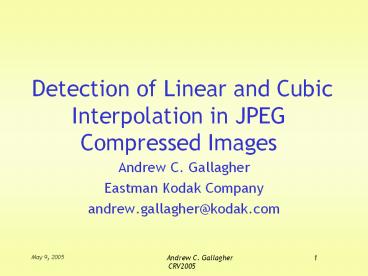Andrew C. Gallagher1 - PowerPoint PPT Presentation
Title:
Andrew C. Gallagher1
Description:
Detection of Linear and Cubic Interpolation in JPEG Compressed ... Linear Interpolation The Algorithm In Matlab, the first three boxes can be executed as: bdd ... – PowerPoint PPT presentation
Number of Views:45
Avg rating:3.0/5.0
Title: Andrew C. Gallagher1
1
Detection of Linear and Cubic Interpolation in
JPEG Compressed Images
- Andrew C. Gallagher
- Eastman Kodak Company
- andrew.gallagher_at_kodak.com
2
The Problem
- An image consists of a number of discrete
samples. - Interpolation can be used to modify the number of
and locations of the samples. - Given an image, can interpolation be detected? If
so, can the interpolation rate be determined?
3
The Concept
i(x0)
y(n0)
y(n1)
y(n2)
- A interpolated sample is a linear combination of
neighboring original samples y(n0). - The weights depend on the relative positions of
the original and interpolated samples. - Thus, the distribution (calculated from many
lines) of interpolated samples depends on
position.
x0
n0
n1
n2
Original samples and an interpolated sample
4
The Periodic Signal v(x)
i(x0 -D)
i(x0 -D)
i(x0)
y(n0)
y(n1)
y(n2)
- The second derivative of interpolated samples is
computed. - The distribution of the resulting signal is
periodic with period equal to the period of the
original signal. - The expected periodic signal can be calculated
explicitly for specific interpolators, assuming
the sample value distribution is known.
d
x0
x0-D
x0D
n0
n1
n2
Original samples and an interpolated sample
1 period
v(x)
n0
n1
n2
Distribution (standard deviation) of interpolated
samples
5
The Periodic Signal v(x)
- Linear Interpolation
- Cubic Interpolation
This property can be exploited by an algorithm
designed to detect linear interpolation.
6
The Algorithm
p(i,j)
- In Matlab, the first three boxes can be executed
as - bdd diff(diff(double(b)))
- bm mean(abs(bdd),2)
- bf fft(bm)
- A peak in the DFT signal corresponds to
interpolation with rate
compute second derivativeof each row
average across rows
compute Discrete Fourier Transform
estimate interpolation rate N
(assuming no aliasing)
7
Resolving Aliasing
- The algorithm produces samples of the periodic
signal v(x). - Aliasing occurs when sampled below the Nyquist
rate (2 samples per period). - All interpolation rateswill alias to N.
- Only two possible solutions for rates Ngt1
(upsampling). An infinite number of solutions for
Nlt1. - The correct rate can often be determined through
prior knowledge of the system.
(Q a positive integer)
8
Example Signals N 2
- After computing DFT
After summing across rows v(x)
9
Example DFT Signals
10
Effect of JPEG Compression
- Heavy JPEG compression appears similar to an
interpolation by 8. - Therefore, the peaks in the DFT signal associated
with JPEG compression must be ignored.
interpolation N 2.8JPEG compression
no interpolationJPEG compression
o(i,j)
digital zoom by N
After computing DFT
JPEG compression
p(i,j)
11
Experiment
- A Kodak CX7300 (3MP) captured 114 images
- 13 images were non-interpolated. The remainder
were interpolated with rate between 1.1 and 3.0.
N
12
Results
- Algorithm correctly classified between
interpolated (101) and non-interpolated (13)
images. - Interpolation rate was correctly estimated for 85
images. - For the remaining 16 images, the algorithm
identified the interpolation rate as either 1.5
or 3.0. This is correct but ambiguous.
13
Conclusions
- Linear interpolation in images can be robustly
detected. - The interpolation detection algorithm performs
well even when the interpolated image has
undergone JPEG compression. - The algorithm is computationally efficient.
- The algorithm has commercial applications in
printing, image metrology and authentication.































